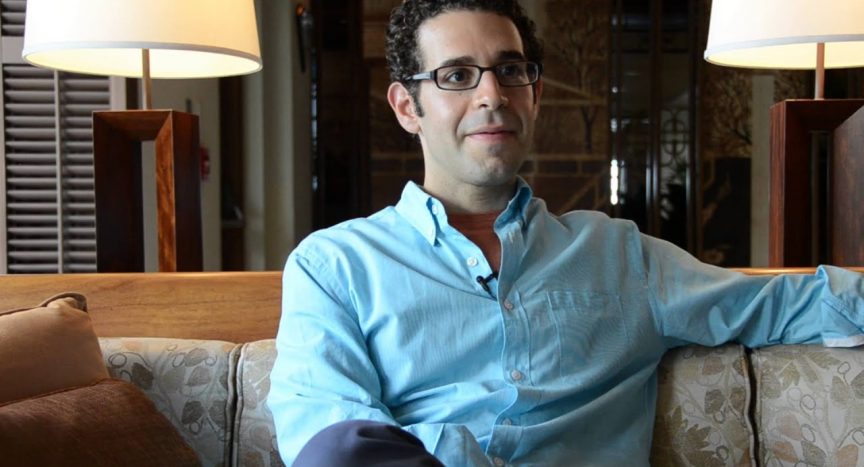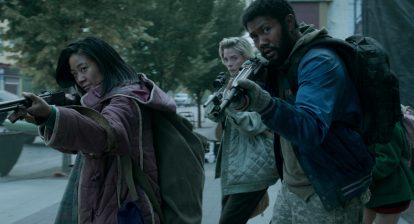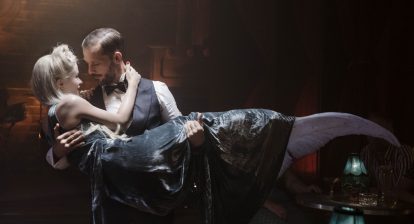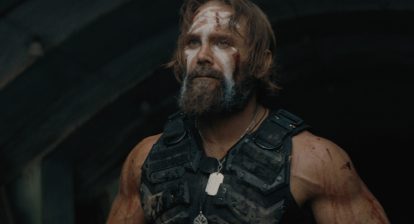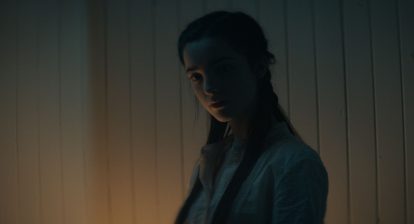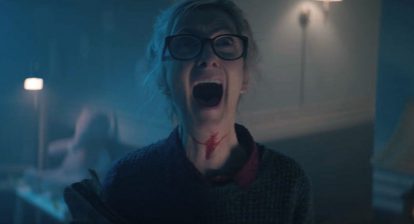If it looks too good to be true, it probably is. That’s the premise for David Marmor’s new horror film, 1BR, which will be premiering at Fantasia International Film Festival July 18th. The official synopsis reads: “After leaving behind a painful past to follow her dreams, Sarah (Nicole Brydon Bloom) scores the perfect Hollywood apartment. But something is not right. Unable to sleep, tormented by strange noises, and threatening notes, her new life quickly starts to unravel. By the time she learns the horrifying truth, it’s too late. Caught in a waking nightmare, Sarah must find the strength to hold onto her crumbling sanity…or be trapped forever in an existential hell.” What do nightmare’s sound like? Cue the film’s composer Ronen Landa. Ahead of the world premiere, Landa discusses his experimental score crafted to match film’s emotional and unhinging premise.

Wicked Horror: In what ways do you think your score adapted from the beginning to the end of the film?
Ronen Landa: Listening to this score from beginning to end is like taking a journey through our main character, Sarah’s mind as the story unfolds. The melodic opening theme is a snapshot of her innocence at the beginning of the film. As her world changes dramatically, the score continually tracks her point of view. Her innocence gives way to confusion and dread. With some deep psychological consequences—and really, each of those stages is reflected in the music. When the terror on screen sets in, we are unleashing a full-scale musical assault with piercing strings, violent percussion and a battery of otherworldly sounds I created in the studio. Then as Sarah begins to adjust to her new reality, the score takes a more emotional turn driven by piano themes. There are a few scenes that are downright disorienting for Sarah and the music traveled into truly psychedelic territory. I loved writing those cues!
Wicked Horror: Every night Sarah hears the very loud sounds that she thinks are pipes. What did you use to create those noises? Was the goal to be as jarring as possible?
Ronen Landa: The pipe sounds themselves are part of the film’s sound design, so I wasn’t the one creating them. At the same time, having such a prominent sound in the film was something we very much took into consideration for the music. When Sarah starts to hear the pipes, we were cautious to keep the music out of their way so they could have their own effect. But as the situation intensifies, the score starts to pick up on that element. I layered in grating metallic sounds and scratchy string tremolos. When that musical echo happens, we feel the sound of the pipes penetrating Sarah’s mind.

Wicked Horror: In some scenes, the score is a lot louder than others. How did you decide what the volume was going to be going from scene to scene?
Ronen Landa: At the end of the day, this is a collaborative decision with the director and the film’s mixer. I am a strong believer in the idea that dynamic changes, especially using silence carefully—help the music make an impact. If we blast it at 10 or 11 the whole time, it just becomes meaninglessness and distracting noise. At the same time, if the music were just a low hum throughout, we’d miss the opportunity to make that deep connection with the audience. In a film like this, especially, it’s critical that the music helps the thrills land with intensity. So we have to manage those hills and valleys carefully. It’s always on my mind.
Wicked Horror: Besides the lead, Sarah, did you give any of characters specific reoccurring themes? If so, can you discuss those.
Ronen Landa: Yes, Sarah has her main theme that returns with variations during the course of the film. There are also a few melodic themes and key sounds that reflect aspects of the story. She is experiencing a strong sense of community and belonging in this apartment complex, and one of our melodic themes accompanies that apparently positive experience. But this community is not exactly typical. We recorded and then completely twisted electric guitars, vocals, and percussive elements to create a textural palette that would reflect her disconnect from a more familiar world.
Wicked Horror: Do you have a favorite musical moment in the film?
Ronen Landa: Oh wow, that’s a tough call! There are so many I really love. Like those psychedelic moments and of course I relish all the experimentation that goes into crafting a great scare. But there is one very emotional scene between Sarah and another resident about two thirds into the film that landed perfectly for me. A bittersweet piano melody that just felt like that ideal combination of music with the drama on screen. I guess I’m just a romantic at heart.
Wicked Horror: Your score in the final scene really helps drive the narrative and signal at that moment the story is going to go North or South, especially during the close up of the fist. Was this the input of director David Marmor or did this just happen organically?
Ronen Landa: I guess as long as we don’t say whose fist it is or what it’s doing this is not a spoiler! That whole scene was an epic challenge, but in the most satisfying way. Most of the horror-type films I’ve worked on have a major set piece or two, but since this very long piece of music came at the end there was a real responsibility to get every moment just right. The director and I worked very closely on the whole musical cue and on that moment in particular. It’s a complicated group of scenes tied together with one piece of music, so there were quite a few twists and turns and musical hits to navigate.
David largely left the musical language to me but the timings, the flow of dramatic intensity, the hits. These were all part of our collaborative process. He has an excellent sense of the dramatic beats and knows how music can work for the film. So it was easy to trust his instincts and at the same time, I think he had a lot of faith in my approach. I guess the answer to your question is a yes to both! David was definitely involved with crafting the score but our collaboration was very organic.

Wicked Horror: Many composers use found objects, that are not instruments, to create eerie sounds. Did you do anything like that for the 1BR score?
Ronen Landa: In my mind, everything is an instrument. You just need to learn how to play it! I’ve definitely done that kind of thing before. My textural palette for The Pact was largely built on sounds I recorded in the apartment I was living in then, and that approach was grounded in the story there. For 1BR, the idea was to reflect this typical apartment complex becoming something very different. So, instead, I took those typical instruments we are all familiar with and turned them inside out with both analog and digital studio mangling. Or in some cases, we just found new and interesting sounds to coax out of an instrument without any mangling. Our phenomenal pianist Karolina Rojahn and I, with some help from David in fact, spent about an hour experimenting with the piano strings and came out with some of the most unique whines and shimmers and drones I’ve ever recorded. I know it’s a little nerdy but I live for that stuff, it’s so much fun.
Wicked Horror: In the horror genre, a score can make or break the film. Did you feel any extra pressure because of that?
Ronen Landa: I wouldn’t call it pressure. It’s really a joy to make music that is so fundamental to the storytelling, that can be at turns traditionally dramatic or totally off-the-wall experimental. And it’s a privilege to collaborate with dedicated filmmakers too, so I’m grateful to be making this music. If you believe in your artistry and have faith in your collaborators, you’ll never let those kinds of thoughts derail your work. The only pressure I feel is deadline pressure. Writing and producing around an hour of densely arranged score on a film’s schedule usually requires some long hours to say the least.
Wicked Horror: How closely did you work with the film’s sound designer? Not to reveal any spoilers, but when Sarah is staring at the wall and the lights are going on and off, the line between sound design and score is very much blended together.
Ronen Landa: David was the link there. He had a very clear idea about blurring those lines and creating a specific sensation and so we all did our part. It worked out really well and is a credit to some excellent film mixing too.
Wicked Horror: Usually when a piano is used in a score, it has more of a calming effect, but in 1BR it creates more of a sinister/uneasy feeling. Did you use this particular instrument to go along with the whole theme of the movie?
Ronen Landa: That’s interesting, I suppose this is not a very calming movie so we had to use it the way we did! To me, the piano is an incredibly flexible instrument capable of so much because of its wide pitch and dynamic ranges, and because it’s capable of playing many notes at once. Add the insides to the sonic possibilities and I think you could create an entire score from that one instrument alone. I gotta try that sometime!
Wicked Horror: I love how central the piano is to this score, both as a part of the textural underbelly and as a melodic and rhythmic focus. Karolina performed the music with such depth too, just amazing musicianship.
Wicked Horror: What are some of your favorite horror film scores?
Ronen Landa: Ah that’s another tough one. I always go back to Herrmann’s Psycho, which is rightfully considered a masterpiece. Nicholas McCarthy (director of The Pact and At the Devil’s Door) turned me on to Ennio Morricone’s score for Mio Caro Assassino, which is another one of his that weaseled into my heart. Of course, the classical music of Ligeti and Penderecki were so critical to The Shining and so unbelievably influential. How much space do we have for this piece? There are a lot of younger composers making great music too, it’s a really inspiring time to be working in the genre.
Also See: Ten Things You Probably Didn’t Know About Psycho
View a clip of the film here. Featured Image Credit: The Vilcek Foundation
